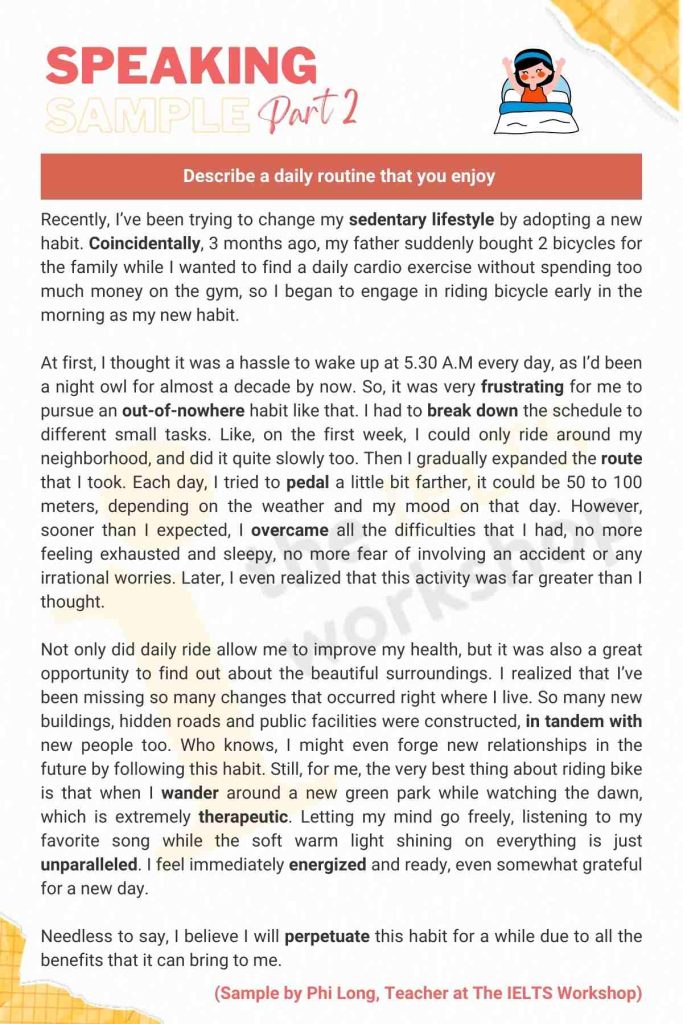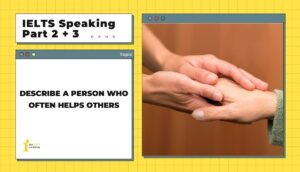Trong bài giải mẫu lần này, thầy Phi Long của The IELTS Workshop sẽ hướng dẫn bạn trả lời topic “Describe a daily routine that you enjoy“ trong IELTS Speaking Part 2. Cùng tham khảo sample, từ vựng và một vài cách diễn đạt ghi điểm trong phần thi IELTS Speaking nhé.
Part 2: Describe a daily routine that you enjoy
Describe a daily routine that you enjoy
You should say:
What it is
When and why you started to follow this routine
Whether it is easy to follow this routine
And explain why you enjoy having this routine in your daily life
Dưới đây là bài mẫu cho topic “Describe a daily routine that you enjoy”.
1. Bài mẫu (Sample)

2. Từ vựng (Vocabulary)
- Sedentary lifestyle (collocation): lối sống thụ động
- Coincidentally (adv): trùng hợp thay
- Frustrating (adj): bực dọc, ức chế, gây nản lòng
- Out-of-nowhere (adj): đột nhiên, bất ngờ xuất hiện
- Break down (v): chia nhỏ
- Route (n): cung đường
- Pedal (v): đạp xe
- Irrational (adj): vô lí, không có cơ sở
- In tandem with (idiom): song song, cùng với điều gì
- Unparalleled (adj): không gì sánh bằng
- Energized (adj): được nạp đầy năng lượng
- Perpetuate (v): kéo dài, duy trì
Part 3:
Bên cạnh Part 2, bạn hãy tham khảo thêm Part 3 cho chủ đề này nhé
Should children have learning routines?
What are the advantages of children having a routine at school?
Does having a routine make kids feel more secure at school?
How do people’s routines differ on weekdays and weekends?
What daily routines do people have at home?
What are the differences between peoples daily routines now and in the last 15 years?
1. Should children have learning routines?
Absolutely. From my point of view, children can learn more effectively if they have a structured schedule. Firstly, learning routines can enhance focus and organization, which can facilitate the memorizing process. Moreover, if children follow their routine in a long time, they will gain more time management skills and self-discipline. These characteristics are not only beneficial for their academic learning process, but also for many other aspects in the future.
- Effectively (adv): một cách hiệu quả
- Structured schedule: lịch trình có cấu trúc
- Facilitate (v): tạo điều kiện
- Time management skills: kĩ năng quản lý thời gian
- Self-discipline (n): tính tự giác
2. What are the advantages of children having a routine at school?
As I have said, a learning routine, at school or not, can help students to organize daily tasks better. When children prepare activities, such as going to classes, doing homework and tests for their routines, they can see the importance of each task and prioritize essential ones first. Additionally, routines can create balance between students’ studying and social development. By maintaining routines at school, students can spend their time to join group activities, sports and collaborative learning, which creates more opportunities to interact with their friends and teachers.
- Prioritize (v): ưu tiên
- Collaborative (adj): có tính hợp tác
- Interact (v): tương tác
3. Does having a routine make kids feel more secure at school?
It depends on each student’s the definition of “secure”. If you mean students should be able to learn and accumulate knowledge at an expected level and students feel confident when they learn effectively, then yes, a routine can help them with that. However, for many students, a sense of security does not come from an excellent school report. Many of them worry about the other issues at schools, namely body image, school violence or exclusion. Under these circumstances, professional help from school counselors would be much better than routines.
- Accumulate (v): tích lũy (kiến thức)
- School violence (n): bạo lực học đường
- Exclusion (n): không hòa hợp, cô lập, loại trừ
- School counselors (n): cố vấn trường học
4. How do people’s routines differ on weekdays and weekends?
Empirically speaking, it can vary widely. On the weekdays, people tend to wake up earlier to go to school or work, or even finish the uncompleted tasks from the previous day. However, weekends are perfect opportunities for all of us to slightly oversleep, which is a great way to recharge our batteries after a hardworking week. This is especially true for the youngsters, including myself. But still, for the elders, things might be a little bit different. Many have had a fixed routine for a long time, weekdays and weekends aren’t that much different. They’d still follow the same everyday habits in the week.
- Empirically (adv): theo thực nghiệm, quan sát
- Oversleep (v): ngủ nướng
- Recharge our batteries (idiom): sạc lại năng lượng
5. What daily routines do people have at home?
Throughout the day, there are a range of activities that people can do at home. Typically, people start with a morning routine involving waking up, freshening up, and having breakfast. Work or study tasks are then tackled, alongside household chores like cleaning and meal preparation. After that, in the evening, personal time is dedicated to hobbies or self-care activities like skincare or meditation.
- Tackle (v): xử lý (vấn đề, công việc)
- Self-care (adj): tự chăm sóc bản thân
6. What are the differences between people’s daily routines now and in the last 15 years?
There are significant shifts in people’s routines today and in the past. Thanks to technology, people are now able to work remotely more frequently, leading to changes in working habits. Working from home can be translated to less commuting time, allowing people to have a more flexible schedule. However, not all the changes are for the better. Technological development has also negatively affected the sleeping routine, especially for people addicted to smart devices. A lot of people suffer from insomnia due to the blue light coming from phones and computers, or many wake up in the middle of the night just to check their social media to see there’s any news.
- Significant shifts (n): thay đổi đáng kể
- Remotely (adv): từ xa
- Insomnia (n): bệnh mất ngủ
Bài mẫu bởi thầy Phi Long – Giáo viên The IELTS Workshop
Các bạn có thể tham khảo các bài mẫu IELTS Speaking Part 2 của The IELTS Workshop cũng như tham gia bài test trình độ tiếng Anh và nhận tư vấn lộ trình miễn phí tại đây!
Nếu bạn muốn nhận Mentor 1-1 để hoàn thiện kĩ năng Speaking của mình trước khi bước vào kỳ thi, tham khảo ngay Khóa bổ trợ từng kỹ năng IELTS của The IELTS Workshop.









